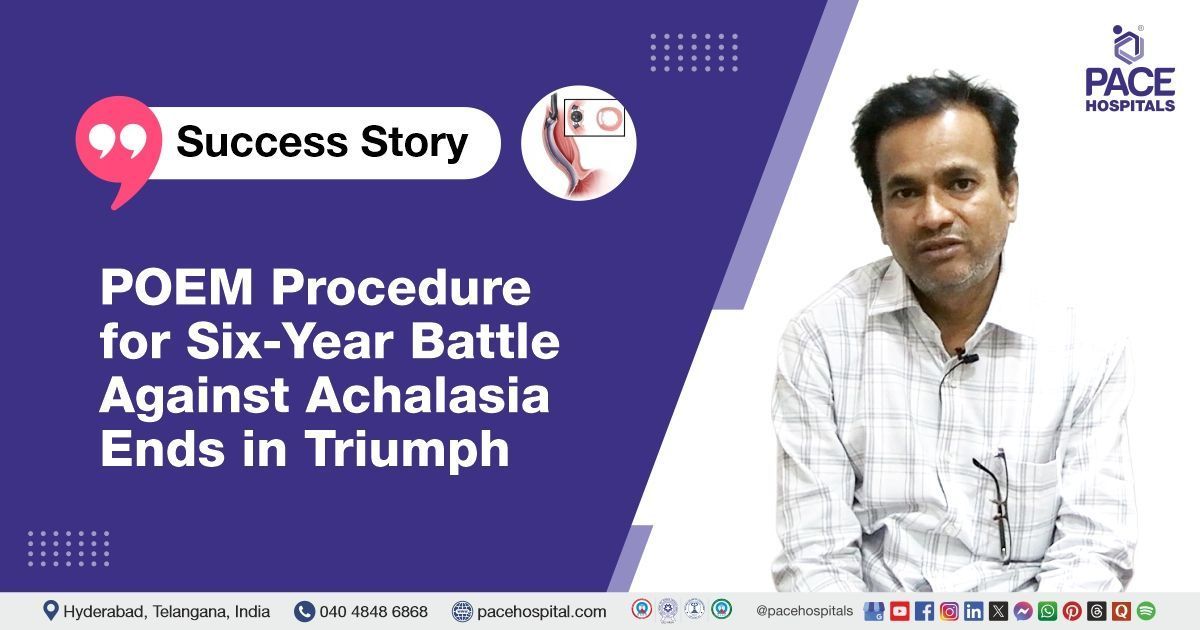POEM Procedure for Six-Year Battle Against Achalasia Ends in Triumph
PACE Hospitals
In a breakthrough procedure, PACE Hospitals’ Gastroenterology team successfully performed a POEM (Peroral endoscopic myotomy) surgery on a 46-year-old male patient with Achalasia, significantly improving swallowing function and quality of life.
Chief complaints
A 46-year-old male patient, presented to
PACE Hospitals, Hitech City, Hyderabad with a long-standing history of progressive difficulty swallowing both solids and liquids since 2018. Additionally, he had been suffering from a nocturnal cough for the past two weeks, prompting him to seek expert care.
Medical History
Upon closer examination, it was revealed that the patient had been struggling with difficulty swallowing both solids and liquids for several years, and over time, this problem had worsened. He also experienced frequent regurgitation, which affected his daily life and prompted his admission to PACE Hospitals for further treatment.
Diagnosis
After a detailed clinical evaluation and diagnostic workup, including upper gastrointestinal endoscopy and esophageal manometry, the diagnosis of Achalasia Cardia Type II was confirmed.
Achalasia Cardia is a motility disorder of the esophagus, characterized by the failure of the lower esophageal sphincter to relax properly, leading to difficulty in swallowing. In this particular case, the condition was classified as Type II, as per Eckardt’s score, which rated his symptoms as moderate. This condition severely impacted his ability to consume both liquids and solids, significantly reducing his quality of life.
Treatment Approach
After consultations with team of Gastroenterologists including Dr. Govind Verma, an Interventional Gastroenterologist, Dr. M Sudhir, a Consultant Gastroenterologist, and Dr. Padma Priya, a consultant Gastroenterologist, the treatment plan was finalized to perform a Peroral Endoscopic Myotomy (POEM) procedure. POEM is a minimally invasive endoscopic procedure that provides an alternative to traditional surgery.
The approach involves making a small incision in the mucosa of the esophagus to cut the underlying muscle layers, effectively relaxing the lower esophageal sphincter and improving the passage of food. This technique is highly effective for patients with Achalasia and offers quicker recovery times compared to conventional surgical methods.
Procedure Overview
Before the surgery, the patient underwent a detailed pre-Anesthesia Checkup (PAC) to assess his fitness for the procedure. This included evaluating his cardiovascular health and ensuring that he was in optimal condition for anesthesia and surgery. After receiving the necessary clearances and appropriate antibiotic prophylaxis, the POEM surgery was successfully performed without any complications.
The POEM procedure was successfully carried out under general anesthesia. Using an endoscope inserted through the mouth, the surgical team performed myotomy on the lower esophageal sphincter, ensuring minimal disruption to surrounding tissues. The procedure was well tolerated, and no immediate complications were noted.
Postoperative Course
Following the procedure, the patient reported mild chest discomfort, which is a known post-procedural symptom. A high-resolution chest CT was performed, revealing minimal pneumothorax, basal atelectasis, and small bilateral pleural effusions. In response, he was started on high-flow oxygen therapy for two days, alongside intravenous fluids, antibiotics, proton pump inhibitors (PPIs), and antifungal medications as part of the recovery protocol.
On the second day of post-surgery, an oral gastrografin study was conducted. The results indicated transient contrast retention in the lower esophagus, with no signs of leakage, confirming the success of the procedure. The patient was gradually introduced to a liquid diet, which he tolerated without issues.
Condition at Discharge
By the time of his discharge, the patient was in stable condition. His dysphagia had notably improved, and he was able to tolerate liquids comfortably. The patient’s overall hemodynamic stability and symptom relief were reassuring, and he was discharged with clear follow-up instructions.
Dietary Instruction
- Liquid diet for 2 days
- Soft diet for the next 3 days
- Transition to a normal diet, thereafter, as tolerated
Urgent Care & Follow-up
The patient was advised to contact PACE Hospitals in case of any symptoms like fever, abdominal pain, or vomiting. After one month, the patient was asked to get a review by Dr. Govind Verma about his status with a prior appointment.
Revolutionizing Esophageal Treatment: The Latest Advancements and Expanding Applications of POEM
Recent advancements in the Peroral Endoscopic Myotomy (POEM) procedure are pushing the boundaries of treatment for Achalasia and other esophageal disorders. One of the most exciting developments is the refinement of POEM's technique, with surgeons now incorporating robotic assistance for greater precision and control. This addition allows for even more minimally invasive procedures with improved outcomes, as robotic arms provide enhanced dexterity for the surgeon, minimizing tissue trauma and potentially speeding up recovery times.
Additionally, the scope of POEM's use has expanded beyond Achalasia. New research and clinical applications have shown the procedure's effectiveness in treating esophageal spasm, jackhammer esophagus, and even certain cases of gastroesophageal reflux disease (GERD) / Acid Reflux that are resistant to traditional treatments. By targeting and relaxing the overactive muscles of the esophagus, POEM is offering patients suffering from these conditions a chance at long-term relief, where other therapies have failed.
With the ongoing evolution of endoscopic technologies, including advanced imaging systems and high-definition endoscopes, the POEM procedure continues to set the bar in terms of surgical precision and patient recovery, solidifying its place as a revolutionary treatment in the world of gastroenterology.
Share on
Request an appointment
Fill in the appointment form or call us instantly to book a confirmed appointment with our super specialist at 04048486868
Appointment request - health articles
Recent Articles











